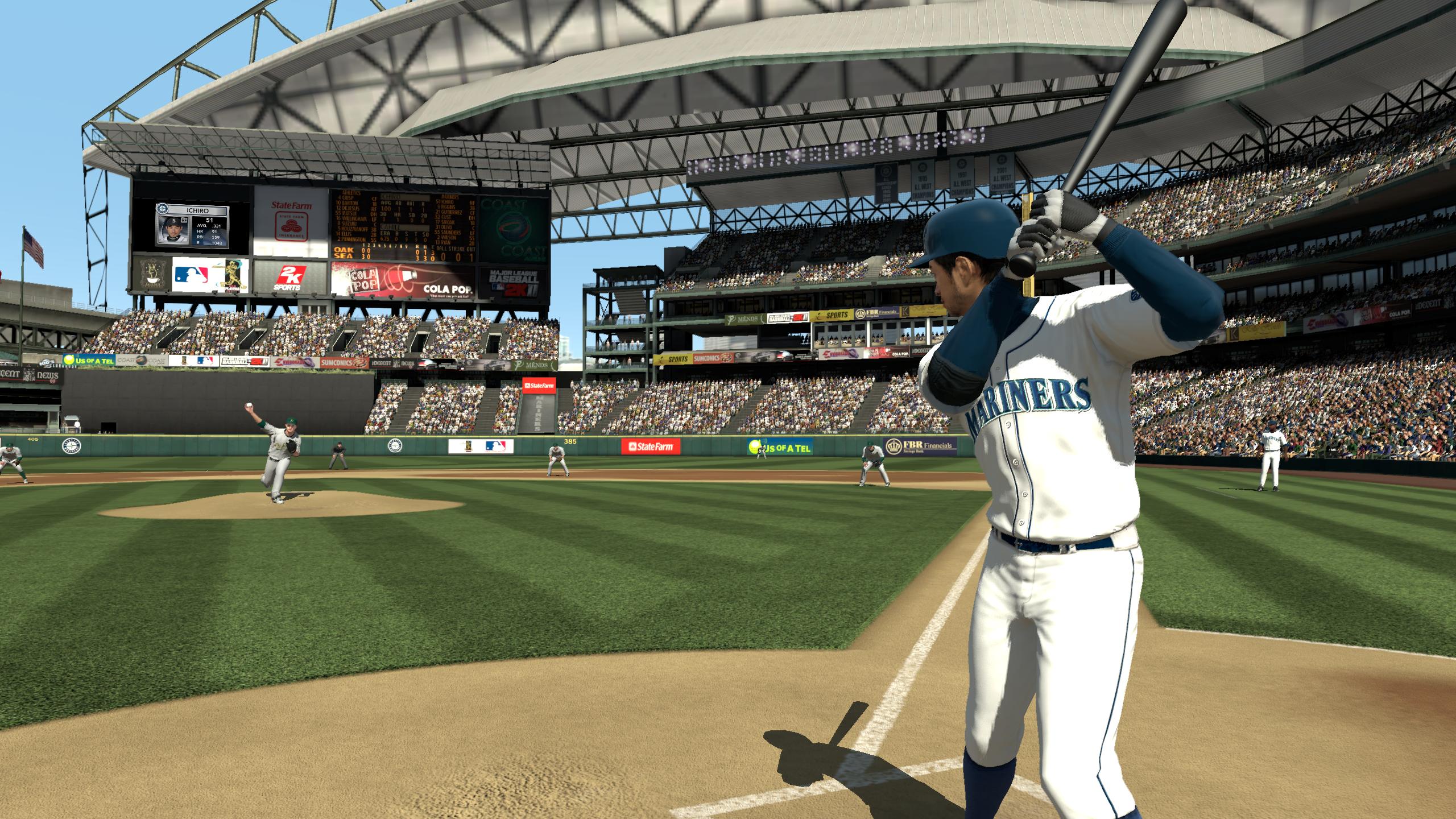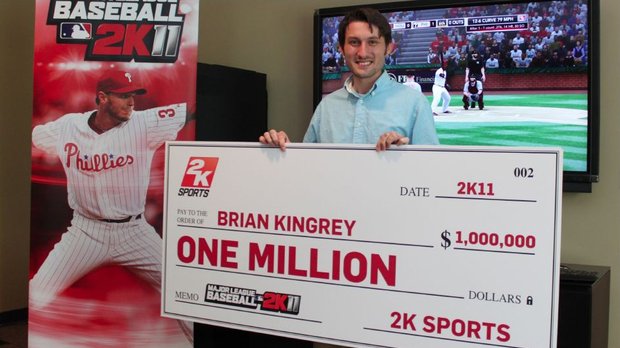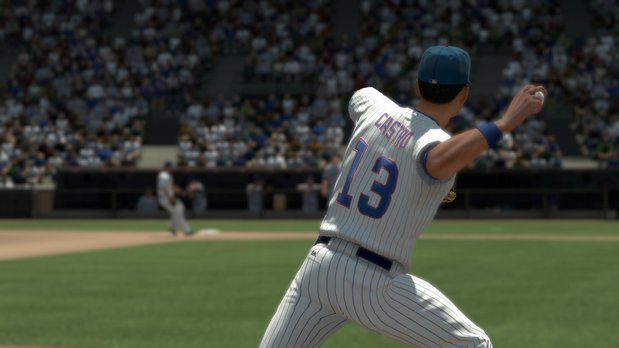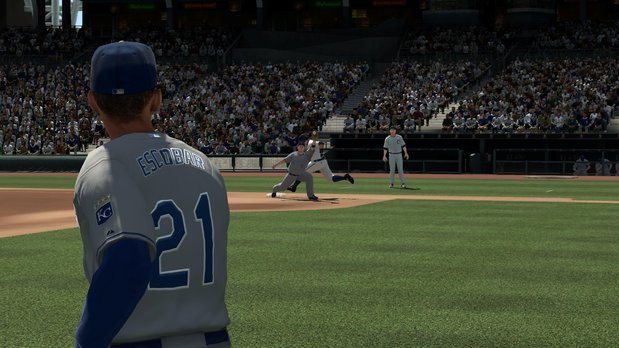How MLB 2K11 - and a million dollars - changed everything
One year after he won a million dollars cash for playing a video game, Box Score catches up with Brian Kingrey to revisit his accomplishment

Box Score is a weekly column that offers a look at sports games and the athletic side of the industry from the perspective of veteran reviewer and sports fan Richard Grisham.
The waiting was the hardest part.
Brian Kingrey had met his goal. After putting in countless hours of practice, analyzing different ways to attack the problem and perfecting his approach, he needed just three attempts on his first day of eligibility to pitch a perfect game in Major League Baseball 2K11. He’d done everything he had to do, from recording the entire game on videotape with a camera over his shoulder, to making sure he’d played the game in the correct mode. Next, he sent everything off to the 2K Sports team.

Then, he waited.
“We had to wait for a whole month, then half of another month, before we got a call,” Kingrey told me when I spoke to him about his efforts to win the million-dollar MLB2K11 Perfect Game Challenge last year. The whole time, he woke up thinking about it and went to bed doing the same. Every day. “It was a grueling process. It was on the top of my mind; I wasn’t sure, because it took me three tries and someone could’ve done it before I did. I was kind of in this zone of ‘I really hope they call me,’” Kingrey said.
Kingrey’s wife was the one who had prompted him to enter the contest in the first place, knowing how competitive he is as well as how good he is at video games.
“Me and my wife were sitting there watching TV when the commercial came on,” he recalled. “I’m not a big sports guy, but she said, ‘So what? It’s a million dollars!’ So I picked it up.”
Weekly digests, tales from the communities you love, and more

Above: And these were the results
Competitive gaming was nothing new to Kingrey, at the time a 25-year-old teacher living in Louisiana. After all, he and a teammate had spent three years ranked No. 1 in World of Warcraft’s Arena, and he routinely winds up at the top of the leaderboards of Call of Duty and Soulcalibur. Being good at games is just in his DNA.
Baseball, though? Not hardly.
“Baseball’s not really a popular sport down here,” he said, referring to his native Louisiana. “So I used all the things I use on other games – I did a lot of research. At the beginning, it was all new to me; I didn’t even know exactly what a perfect game was. I thought you had to strike everybody out. The concept was a lot easier after I learned what it meant.”
Kingrey dove into the sport, researching who the best pitchers and lousiest hitters were, as well as tendencies and favorable matchups. He decided to use the 2011 Opening Day game of the Phillies vs. the Astros; the Phils’ Roy Halladay is one of the best pitchers in the game, while Houston’s squad of hitters is fairly inept. Then, he had a brilliant idea that wound up being the key to success.

“I remember these sports announcers talking about how Mariano Rivera’s cut fastball is unhittable,” he laughed. “I thought, ‘since it’s unhittable, I’ll try to use it with Halladay,’ even though it’s not a pitch he would often use. I used the motion for the cut fastball and tried to master that pitch. I relied on foul balls and popups, and I put all my fielders on the right side of the field in this horseshoe formation. I would pitch it to the left with the cutter, and when the batter hit it, they would hit to right to my fielders. I had favorable odds.”
In the leadup to the first day of the contest, he practiced up to five hours a day and was getting at least two perfect games each session by the final week before it officially started. Then he went to Best Buy and purchased a camera – although he knew he’d be quickly returning it. He simply couldn’t afford the expense.
On the first day of the contest, Kingrey turned on the camera and his Xbox, and settled in. His first two attempts failed – thanks mostly to Bill Hall – but by the third game, he’d gotten his gem recorded and saved.
“I called my wife and told her I did it,” Kingrey remembered. Then, of course, there was that painfully long six-week wait.
When they finally called, the reps at 2K Sports never tipped their hand.

“They said they wanted to meet with me, that they were calling everybody and they want everyone to come up and meet with them,” Kingrey said. “When I got up there [to New York City], they were testing me to make sure if I could really pitch a perfect game. I had to sit there with their dev team and play the game. Then, they said ‘OK, we’re going to eat lunch, and you’ll be on your way.’”
His heart dropped. “I was like, what do you mean?”
The 2K Sports team knew all along that Kingrey was the winner, but made him sweat it out. Then, they finally let the cat out of the bag.
“When we get to the room where lunch is, there’s like a hundred people sitting in there cheering and applauding,” Kingrey said. “There’s cameras everywhere, and a huge check.”
Naturally, Kingrey’s life was immediately and forever changed. A few days later, he received a real check in the mail for a cool million dollars; he paid off his house, his car, and bought another car – after handing a sizable amount over to the federal and state governments, of course.
“I can’t tell you how relieved I was,” he said. “It was just like total freedom given to you. A great feeling.”
A year later, Kingrey’s life continues to evolve. He’s no longer teaching, but he is pursuing his dreams to be a – you guessed it – video game developer.
“Since then, I’ve had the opportunity to go back to school for a Masters in computer science,” Kingrey told me. “All the jobs I’ve ever really wanted all required a computer science degree of some sort, so getting this will help; I’m hoping to get a good job with that. Game development would be awesome.”

Unlike so many lottery winners you hear of that have their lives ruined because of unexpected windfalls, the humble and gracious Kingrey has been smart and cautious with his winnings. “All the money I have is invested right now, so I’m hoping in 20 years, that’ll really help me. If I land a good job I can retire early, hopefully.”
I’m thinking he’s got a decent shot at that goal too.
Richard Grisham has been obsessed with sports and video games since childhood, when he'd routinely create and track MicroLeague Baseball seasons on paper. He currently lives in New Jersey with his wife and four-year old son, who he'll soon be training to be an NFL placekicker. As a freelance journalist and writer, his work has appeared in GamesRadar, NGamer, and 1UP.


